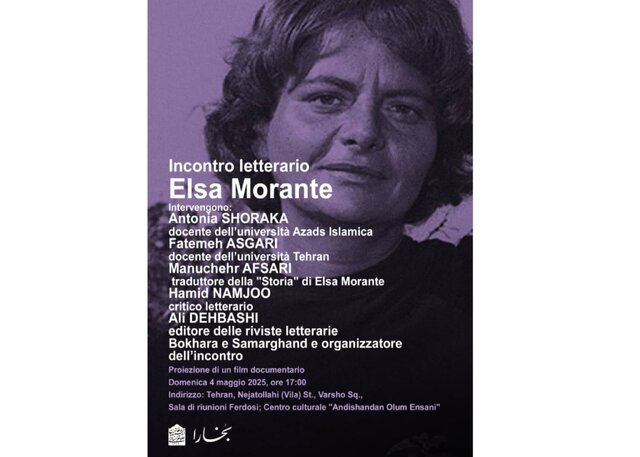Tehran – Literary Conference “Elsa Morante Night” will be held on Sunday at Humanities Thinkers in Tehran.
According to ISNA, this will be the 834th session of Bukhara Night, dedicated to exploring the life and work of Italian writer, researcher and translator Elsa Morante.
Speakers for this event include Antonia Sholaka, Fatemesgari, Manushua Afsali, Hamidnamju and Alidebashi.
Elsa Morante (1912-1985) was an Italian novelist, poet, translator, and author of children’s books. She is known for the grand and mythical quality of her work. This usually focuses on the struggles of young people when sympathizing with the adult world. Her novel “History” is included in the Bokklubben World Library list of the 100 greatest books ever.
The event’s announcement describes Morante’s literary life as a unique and dedicated experience in the 20th century literary realm. This is the author who is completely devoted to literature and has a longing to live relationships with passion and ecstasy.
As a recorder of Postworld Italy, Morante never stopped pursuing the thrill of beauty and creation. She viewed literature as a bright will of the whole life, pouring her limitless imagination into it, spreading it all over the realm.
This perspective was closely tied to her innate gifts for storytelling, allowing her to stand on par with her husband, Alberto Moravia. However, Morante rejected many systematic optimizations, intellectual exfoliation, and predefined norms, instead creating a bright, ecological, overwritten style.
In her novel “History,” Morante writes about her character from intentional distance. In her world, “explanations of the death and life have been erased.” From this distance, the faint animal-like moan of Ida, a character intended for exile, can be heard, “I wish I hadn’t belonged to humanity.” This is just one of many suggestions of “history” that points to the animal realm.
Morante has nurtured a love for music, books and cats. Her favorite books included The Iliad, Don Quixote, and Hamlet. She was also interested in Freudian psychology, Plato, and Simone Weil.
Most of Morante’s biggest works are shaped by her life choices and experiences, and are reflected in the protagonist. One of the central themes of Morante’s work is narcissism. Most of Morante’s main characters use autobiography as a way of self-therapy and seeking hope. Narration will be the main tool. Her writing is essential to shaping a positive awareness of her personal memories.
Another important aspect of Morante’s work is the love palpation. According to her, love is passion and obsession, which can lead to despair and destruction. Love and narcissism are well-connected themes. Most of Morante’s characters want love, not because they have real feelings for the person they fell in love, but because they need to cover up their emptiness from childhood. Through love and narcissism, Morante introduces other themes, such as the role of motherhood and the meaning of childhood experiences.
A segment of a documentary about Elsa Morante’s life will also be shown during the event.
House of Humanities Thinkers is located at the confluence of Nejatrahi (villa) and Warsaw Street.
SS/

